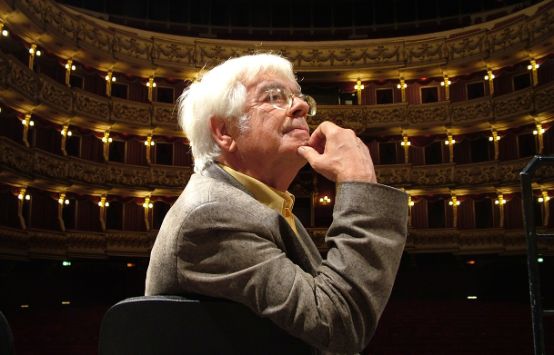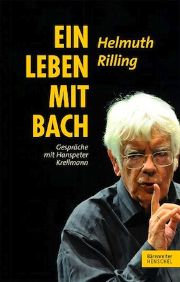Music must shake things up
Book review: In sparkling conversations, we gain an insight into the eventful life of the Bach specialist, conductor and music teacher Helmuth Rilling.

Rilling answers the skillful questions of the publicist and dramaturge Hanspeter Krellmann in such a lively and detailed manner that an exciting flow of reading is created, interspersed with photographs. After the introduction to the still active present of the octogenarian and his attitudes towards consistent fidelity to the score and proximity to the audience (Conversation concerts 2013), we learn of courageous decisions and lucky coincidences (Germani, Bernstein) during his student days and of his smooth transition into professional life as organist and director of the Gächinger Kantorei. Thanks to his communicative talent and inspiring initiatives, door after door opened. He escaped the precarious conditions of the post-war period and soon gained influence beyond Stuttgart with his consistent art of leadership, which involved everyone in the music scene.
The result is immense: Performances of all Bach works, concerts by the Bach-Collegium throughout Europe, a nine-page discography, the International Bach Academy in Stuttgart with research, publication and concert activities and one of the best-stocked Bach libraries, Bach festivals created by him worldwide, especially the one in Eugene, Oregon (USA), which has existed since 1970, Oregon (USA), many successful choir conductors who studied with him at the Hochschule in Frankfurt, the international oratorio weeks with young people and the week-long Bach academies around the world (Leipzig, Prague, Moscow - across the Iron Curtain! - Santiago de Compostela, Tokyo, Caracas), oratorios by Penderecki, Sandström, Pärt, Gubaidulina, Tan Dun, Golijov and Rihm, all commissioned by him.
Johann Sebastian Bach is at the center of Rilling's work. Early on, he decided on a self-created middle position for his interpretation between the Romantic style with a large amateur choir and orchestra that has been common since the 19th century and the original sound movement that has been emerging since 1950; his aim is to make the composer's intentions audible, which he explores through intensive score analysis: "Music must never be comfortable, not museum-like, not appeasing. It has to shake people up, reach them, make them think." He also turned his attention to many other composers of all times, but only to works that met these criteria.
The many statements about the working methods at rehearsals, conducting, dealing with the text, the use of women's voices, boys' voices or countertenors, Bach's various creative phases are valuable ... It is hardly possible to list everything one takes in while reading! It's a pity that the appendix lacks subject and composer indexes, because the need to look something up later is great.
Helmuth Rilling A life with Bach. Conversations with Hanspeter Krellmann, 216 p., € 24.95, Bärenreiter/Henschel, Kassel/Leipzig 2013 ISBN 978-3-7618-2324-8
Highlights and quotes from the book, selected by Walter Amadeus Ammann:
Page 12 On repeatedly performing one of the works from his canon of 18th and 19th century oratorios: I go back to my scores and often discover details in them that I hadn't noticed before. For me, it's like: "That's a new piece now."
13 A problem situation can be changed in perspective with composure.
15 Beethoven's 9th Symphony, in the last movement the text disturbs him: its enthusiastic, utopian language conveys a way of thinking that I couldn't understand early on. I'm still open to the hymn, but there are some quasi-recitative passages with the choir that sound too simple to me.
34/35 Due to a lack of certificates from the choir at Stuttgart University, the organist, who practiced diligently, would not have been admitted to the choir conducting course if he had not learned the double bass in two days, which was missing from the orchestra!
45 With the Gächinger Kantorei, I learned for life that the conductor alone, or rather: I as a conductor, can do nothing without the cooperation of many like-minded people.
49 Bernstein's collegiality and friendliness during rehearsals. I remember the timpanist at the time telling him that he couldn't play after his beat. The mood didn't deteriorate, but Lenny (Bernstein) said: "Then I'll do it differently." "Much better", said the timpanist to him in front of the whole orchestra. Bernstein's principle was therefore: "I may be the boss here, but you have to make the music. So we do it together."
54/5 What new things are created when a competent composer chooses a text and translates it into music? Because then a special sonority is created beyond the areas of "vocal" and "instrumental" and through the combination of the two media.
66 The music is experienced in the concert, beforehand we have treated it.
67 The most important educational task of a conductor is to teach the audience to listen to each other.
68 The conductor is ... primarily responsible for the basic balance of the groups: the relationship between singers and instrumentalists and, in the orchestra, between all orchestral groups. The conductor must enforce this balance in rehearsals.
74 What makes Schubert stand out are the emotions that he releases in his masses. They are filled with such fervor that it is difficult to name Protestant composers who would have achieved this in their own way.
81 Choir arrangement in rows produces a mixed sound.
82/3 Conducting from memory: I want to make music with the ensemble. To do this, I not only have to see it in every situation, but I also have to be able to recognize whether the groups and the individual musicians are ready to react to certain musical sequences.
84 I know from a lifetime of experience what you have to do as a conductor in terms of movement in order to achieve certain things in the performance ...
85 I think it's wrong to simply let soloists sing, to just accompany them. I have to lead them and coordinate with the ensemble that accompanies them.
91 On the equal treatment of vocal and instrumental articulation: Bach prescribed a clear articulation for the orchestra (in the Kyrie of the Mass in B minor) ... In the choral parts, although they adopt the identical musical sequence, there are no articulation instructions ... The same musical material - that is one of my basic interpretative attitudes - must always be treated equally.
96 On the original sound: ... We can perhaps reconstruct a performance of Bach's time to some extent ... Today's listener is no longer the right recipient for the musical message of that time ... For me it is important ... to make the meaning of the work clear for today's listener.
97 Articulation is the most important creative element. For example, every time a motif appears ... it must always be articulated in the same way throughout the ensemble ... Over the years, I have increasingly understood that the broad spectrum of articulation possibilities, from legato, non-legato to staccato, has an infinite number of nuances and plays a decisive role in the interpretation of the music and the clarity of an interpretation.
104 Bach is the teacher of all musicians
108/9 Reservations about Handel: Handel's genius arose from the inspiration of the moment ... The melody part is important to him, perhaps also the bass part, but what lies in between is quickly written down and not critically reconsidered.
110 Bach's creative peak in 1723-1730: after that his creativity declines, almost plummets ... All the more significant are the few new pieces from this period - for example in the Mass in B minor, the Et incarnatus, probably his last choral piece ever. Rilling also mentions Kunst der Fuge and Musikalisches Opfer.
111-125 Overview and assessment of the most important oratorio composers. Language problems for German performances by Janáček and Martinů.
128 Dynamic rules are not sufficient even in Romantic scores, because ff is not the same for brass and woodwinds.
180 Bach himself ... is ... the backbone of my entire work. I also wanted to make the language of our time audible. ... I am of the opinion that every person alive today who is a performing musician and does not perform contemporary music should have a very guilty conscience.
181 The Darmstadt School ... didn't convince me. The style of the music was never the most important thing to me. I wanted music to reveal a gesture that expresses something that listeners are also capable of feeling.
184 Regarding recording sessions in the studio: even without a live situation, you have to make sure that not only everything is done correctly, but that the emotional and unique aspects of a performance are preserved.








